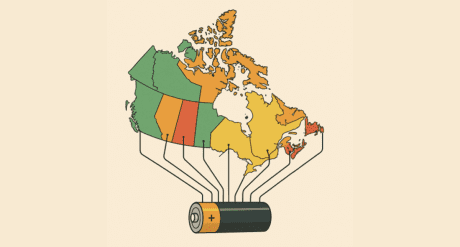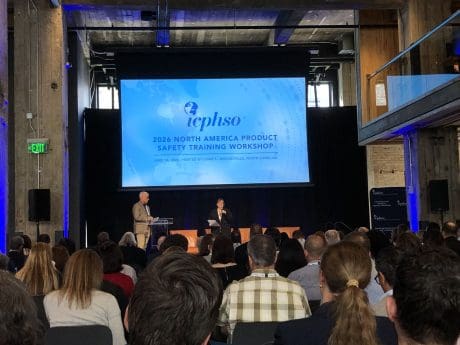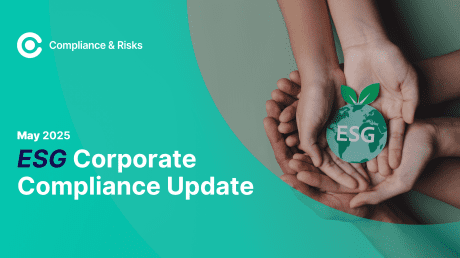
What’s Trending In Compliance? (February 2023)

At Compliance & Risks we help manufacturers, retailers and their supply chain partners to monitor and manage global regulations via C2P, our compliance knowledge management platform.
These are some of the top trending compliance topics that generated the most interest globally for February.
1. EU: Batteries and Waste Batteries, Draft Regulation, January 2023
Authored By Celia Le Lievre, Senior Regulatory Compliance Specialist
On 9 December 2022, the EU Council and European Parliament reached a provisional agreement on a new proposal to strengthen EU legislation on batteries and waste batteries.
The agreement proposes to enact a new regulation which, in essence, aims to establish a circular economy for the battery sector and make all batteries more sustainable throughout their entire lifecycle.
This initiative builds on the ambitions of the Circular Economy Action Plan and European Green Deal.
A final provisional version of this draft regulation was published on 18 January 2023. If enacted, the new regulation will repeal the existing Batteries Directive (after a period of 24 months after its entry into force) and amend Regulation (EU) No 2019/1020 on market surveillance and compliance of products.
In terms of scope, the new regulation would apply to all categories of batteries placed on the market or put into service within the EU, regardless of whether they were produced in the Union or imported.
As such, the rules concern not only batteries that are placed on the market on their own but also batteries that are designed to be incorporated into appliances or products or otherwise supplied with electrical and electronic appliances, light means of transport and vehicles.
The following categories of batteries are explicitly listed: portable batteries, SLI batteries, light means of transport batteries, electric vehicle batteries and industrial batteries.
Some of the key aspects of this proposal are captured below:
Sustainability Requirements:
This new proposal introduces sustainability requirements and reinforced EPR obligations with respect to carbon footprint, collection and recycled content, performance and durability of new batteries.
The proposal sets targets for producers to maintain durability and achieve collection targets for portable batteries.
Producers or producer responsibility organisations would be required to attain the following collection targets for waste portable batteries: 45 % by 31 December 2023; 63% by the end of 2027 and 73% by the end of 2030.
Likewise, producers will be expected to achieve a minimum collection objective of 51% in 2028 for LMT batteries (batteries for light means of transport).
This target will be increased to 61% in 2031.
The proposal sets out high levels of recovery for materials including lithium, lead, cobalt, nickel and copper.
Mandatory minimum levels of recovered content are set at 16% for cobalt, 85% for lead, 6% for lithium and 6% for nickel.
What is more, the draft requires that a carbon footprint declaration be prepared for each battery model for rechargeable industrial batteries (with a capacity above 2 kWh), light means of transport batteries and electric vehicle batteries. The declaration would be mandatory for EV batteries, LMT batteries and rechargeable industrial batteries with a capacity above 2kWh.
Battery producers are also required to establish waste battery take-back and collection systems for portable batteries, SLI batteries, industrial batteries and electric vehicle batteries and LMT batteries regardless of their nature, chemical composition, condition, brand or origin.
Due Diligence Obligations:
Another critical aspect is the introduction of due diligence obligations for economic operators placing batteries on the EU market.
The due diligence obligations adopt the risk-based approach mandated that OECD Guidelines, such as the Due Diligence Guidance for Responsible Supply Chains of Minerals from Conflict-Affected and High-Risk Areas.
The proposal requires the adoption of supply chain due diligence policies with respect to critical raw minerals identified in Annex X (i.e. cobalt, natural graphite, lithium, nickel, and their chemical compounds).
The environmental and social risks associated with these materials must be identified and carefully assessed as part of a risk management plan.
Economic operators must also establish and operate a system of controls and transparency over their supply chains.
Due diligence policies must be implemented within 24 months after the entry into force of the Regulation.
They shall be verified and periodically audited by a third party.
Due diligence obligations will not apply to economic operators whose net turnover is less than EUR 40 million in the financial year preceding the last financial year.
Digital Battery Passport:
Another innovation concerns the introduction of a Digital Battery Passport (DBP).
The DBP is a digital record system that enables the transfer of information between parties. The passport will facilitate communication of information with end-users, second-life operators and recyclers.
The passport shall be accessible through a QR code which must be engraved or printed on the battery. The QR code will be linked to a unique identifier that the economic operator shall attribute to the battery.
In short, the digital passport will contain information relating to the battery model and information specific to the individual battery (as specified in Annex XIII).
This information must include, among other things:
- Information for the general public, including the manufacturer’s identification, place and date of manufacture, weight, battery category, presence of critical raw materials etc;
- Material composition of the battery, including its chemistry and presence of hazardous substances contained in the battery other than mercury, cadmium or lead, and critical raw materials contained in the battery;
- Carbon footprint information;
- Share of renewable content;
- EU declaration of conformity;
- Information on responsible sourcing and due diligence policies;
Certain sensitive commercial information in the battery passport will only be accessible by market surveillance authorities and a limited number of persons with a legitimate interest.
This applies to dismantling information, including safety, and detailed composition which is essential for repairers, remanufacturers, second-life operators and recyclers.
It also applies to certain information concerning individual batteries, which is essential to those who have purchased the battery or other parties acting on their behalf for the purposes of:
- Making the battery available to independent energy aggregators or energy market participants,
- Evaluating the residual value or remaining lifetime for further use,
- Preparing for re-use, preparing for repurpose, or repurposing or remanufacturing of the battery.
The EU Council and European Parliament must now officially endorse and adopt the new regulation before it can enter into force.
2. Spain: Control Measures for the Import of Electrical and Electronic Equipment, Batteries and Accumulators, Royal Decree 993/2022
On 20 November 2022 the Spanish Ministry of the Presidency approved Royal Decree 993/2022 which adopts control measures for the import of electrical and electronic equipment, batteries and accumulators from third countries.
The purpose of this Royal Decree is to establish the control and inspection procedures for electrical and electronic equipment and batteries and accumulators from third countries prior to their release for free circulation in the European Union, in order to verify that:
- Imported EEE complies with the established standards regarding restrictions on the use of hazardous substances;
- Parties introducing EEE and batteries, accumulators into the market have complied with their obligations with respect to the Integrated Industrial Registry established in Royal Decree 110/2015 in relation to EEE waste, and Royal Decree 106/2008 in relation to the environmental management of waste batteries and accumulators.
The Decree applies to imports from third countries of the following products:
- EEE included in the categories established in Annex I with regard to restrictions on the use of certain dangerous substances (except products excluded under the RoHS Decree);
- EEE referred to in Annex II, as well as to all types of batteries, accumulators and batteries, regardless of their shape, volume, weight, composition or use included indicatively in Annex III, regarding the supervision of compliance with the obligations regarding the Integrated Industrial Registry.
The Official Service for Inspection, Surveillance and Regulation of Exports (SOIVRE Inspection Service) will perform the controls and inspections of the products referenced above.
Importer Obligations:
Any importer of EEE included in Annex I must, by himself or through his customs representative, provide the necessary technical means to access the merchandise subject to control, allowing compliance with the relevant control actions, and must provide all the information and documentation necessary to demonstrate the conformity of the EEE in a language that said authority can easily understand, and cooperate with it, at its request, in any action aimed at ensuring that the EEE is compliant.
Importers established in Spain that sell EEE, batteries and accumulators in the Spanish market, including those that make distance sales from other countries, must be registered in the Integrated Industrial Registry in accordance with Royal Decree 110/2015 and Royal Decree 106/2008.
The importer may appoint an authorized representative who will be responsible for complying with the registration obligation or, failing that, there must be a producer based in Spain that will provide the Integrated Industrial Registry number.
If the importer is not established in Spain, he must mandatorily name an authorized representative.
Prior to the release of their merchandise for free circulation, importers or their customs representatives must submit a notification, as a request for control, to the SOIVRE Inspection Service.
This Royal Decree will enter into force on 16 January 2023.
3. Maine (USA): Prohibition of Products Containing Perfluoroalkyl and Polyfluoroalkyl (PFAS) Substances, House Paper 1113, Legislative Document 1503 Enacted, 2021 – Proposed Amendment – (on designating rules related to PFAS as major substantive rules) Legislative Document 171, 2023
Authored By Emily Trywhitt Jones, RINA
The US state, Maine, implemented on 1st January 2023 a reporting requirement for any products sold in Maine under Title 38 §1641 of the Maine state code titled “An Act To Stop Perfluoroalkyl and Polyfluoroalkyl Substances Pollution”. Reporting is required for each product where any Perfluoroalkyl and Polyfluoroalkyl Substances (PFAS) is used intentionally and requires producers to submit information on the following:
- A brief description on the product
- Purpose of the PFAS in the product, including in any product component,
- Amount of PFAS in the product and its CAS number
- The name and address of the manufacturer, and the name, address and phone number of a contact person for the manufacturer.
Reporting must include all PFAS uses, but the packaging of a product is not required to be reported.
The report must be submitted prior to when the product is first offered for sale in Maine.
The system for submitting the reports is not currently in place, so information should be submitted by email to PFASproduct@maine.gov.
Reports must be amended when there is a substantial change in the product, with what constitutes a substantial change to be clarified as part of the rulemaking process at a later date.
If information is still being gathered to support submissions, a request can be submitted by either individual companies or as a trade association for a whole industry sector for additional time.
Such request need to describe the efforts being undertaken to gather evidence and the timeline required to complete such information gathering.
There is a fee for manufacturers submitting the first three notifications and an additional for each additional new notification, to cover the administrative costs of the department administering the notifications.
PFAS Definition:
PFAS substances included the scope of the reporting are any fluorinated organic chemical which contains at least one fully fluorinated carbon atom, however there is no exhaustive list of substances provided by either Maine, or the US Environmental Protection Agency.
Quantity Calculations:
The quantity of PFAS should be either determined by commercially available analytical methods or as range of as yet undetermined values yet to be agreed.
Estimations of the quantity would only be accepted if there is a high degree of certainty and confidence what the actual concentration is in any given product.
Further Impacts:
The act also states that from 2030 any product containing intentionally added PFAS cannot be sold in Maine, unless it is specifically designated as unavoidable.
It is noted that refrigerants, although included in the scope of the above requirement, will not be subject to this restriction.
4. EAEU: Procedure for Registration, Suspension, Renewal and Termination of Declarations of Product Conformity with Technical Regulations of the EAEU, Decision No. 41, 2018 – Amendment – (on certificates of conformity) Decision No. 200, 2022
On 20 December 2022, the Eurasian Economic Commission adopted Decision No. 200 amending Decision No. 41 on the procedure for registration, suspension, renewal and termination of declarations of product conformity with technical regulations of the Eurasian Economic Union.
The Decision established the following changes:
- The list of documents and information attached to the declaration of conformity has been expanded;
- The terms for consideration and registration were reduced from 5 to 3 working days;
- Added the possibility to submit the declaration and the necessary documents to the authorized body (certification body) by courier service;
- In the application for registration of the declaration it is necessary to indicate the conditions and period of storage of product and its service life (shelf life) or product resource (in cases provided for by technical regulations, regulatory documents, standardization documents and technical documentation of the manufacturer).
Decision No. 200 will enter into force on 22 January 2022 with the exception of paragraphs 2 and 4 of the amendments (Annex to this decision), which will enter into force following a decision of the Board of the Eurasian Economic Commission on amendments to the procedure for the formation and maintenance of a unified register of issued certificates of conformity and registered declarations of conformity.
5. Philippines: Implementing Solid Waste Management Act RA 9003, Administrative Order AO 34, 2001 – Amendment – (on implementation of the extended producer responsibility schemes) Administrative Order No. 2023-02
The Department of Environment and Natural Resources (DENR) issued implementing rules and regulations (IRR) of Republic Act 11898, also known as the Extended Producer Responsibility (EPR) Act of 2022. This law requires large-scale companies to establish a mechanism for the recovery of their plastic packaging.
Through the EPR, obliged companies “have the responsibility for the proper and effective recovery, treatment, recycling or disposal of their products after they have been sold and used by consumers” to reduce the volume of plastic wastes generation and extend the life of plastics by adding value or purpose through upcycling or recycling.
The EPR law will also help in advancing a circular economy that mitigates climate change and protects our life-supporting ecosystems by avoiding or minimizing pollution while maximizing the use of materials.
Stay Updated On Global Regulations
This information is based on the most viewed regulations on C2P this month. If you would like to find out more about how you can stay on top of global regulations, why don’t you Book a Demo with our team today?
Sign Up To Our Newsletter
Join 30,000+ compliance professionals for updates on hot compliance issues and more!








